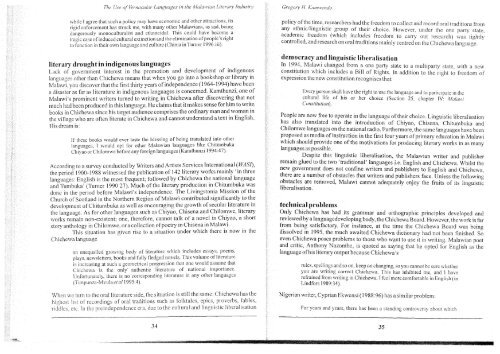Shane Moran - Alternation Journal
Shane Moran - Alternation Journal
Shane Moran - Alternation Journal
Create successful ePaper yourself
Turn your PDF publications into a flip-book with our unique Google optimized e-Paper software.
71e lise<br />
~rnoa~~liii- I,crizgii~lges 1r1 the 1bf IPILIZLS~YJJ (?IY~(IYJ> IT. Kczr~~nnvenilo<br />
while 1 agree that such a policy may have econo~nic ;111d oll~cr attractions. its<br />
rigid cnfor.ceinent has struck me, with many other Malawians, as sad, bcing<br />
iiangcrously monoculturalisl and ethnocidal. 'This could have become a<br />
tragic case of induced cultural extinction and the elimination of peoplc's right<br />
to liunction in their own language and c~ilture (Chima in .Turner 1996:iii).<br />
literary drought in indigenous languages<br />
Ldck of government interest in the promotion and development of indigenous<br />
languages other than Chichewa means tliat when you go into a bookshop or library in<br />
Malawi, you discover that the first thirty years of independence (1 964- 1994) have been<br />
a disaster as far as literature in indigenous laiiguages is concerned. Kamthunzi, one of<br />
Malawi's prominent writers turned to writing in Chichewa after discovering that not<br />
much had been produced in this language. He claims that it makes sense for him to write<br />
books in Chichewa since his target audience comprises the ordinary man and wornan in<br />
the v~llage who are often literate in Chichewa and cannot understand a text in E~~glish.<br />
His dreain is:<br />
If these books would cvcr taste the blessing of being translated into other<br />
languages. I would opt for other Malawia11 languages like Chitumbuka<br />
Chiyao or Chilo~nwe before any foreign languages (Kamtlnunzi 1994:47).<br />
According to a survey conducted by Writers and Artists Services International (WASI),<br />
the period 1900-1988 witnessed the publication of 142 literary works mainly 'in three<br />
languages: English is the most frequent; followed by Chichewa the national language<br />
and Turnbuka' (Turner 1990 27). Much of the literary production in Chiturnbuka was<br />
done in tlie per~od before Malawi's independence. The Livingstonia Mission of the<br />
Church cf Scotland in the Northern Region of Malawi contributed significantly to the<br />
development of Ch~tun~buka as well as encouraging the growth of secular literature in<br />
the language. As for other languages such as Chiyao, Chisena and Chilomwe, literary<br />
works remain non-existent; one, therefore, cannot talk of a novel in Chiyao, a short<br />
sto~y anthology in Chilomwe, or a collection ofpoetry in Chisena in Malawi.<br />
This situation has given rise to a situation under which there is now in the<br />
Chichewa language<br />
an unequalled growing body of literature which includes essays. poems.<br />
plays: newsletters, hooks and fully fledged novels. This volunle of literature<br />
is incrcasing at sucli a geo~netrical progression that onc would assunie that<br />
Clzichewa is thc only' authentic literature of national iniportance.<br />
Unfortunately, there is no corresponding literalure in any other la~lguagcs<br />
(I'impuiin~MvuIartal 1995:4).<br />
When ~ vc turn to the oral literature side, the situation is still the same: Chichewa has the<br />
highest list of recordings of oral traditions such as foiktales, epics, proverbs, fables,<br />
riddlcs; ctc. In thc prcindependence era, due to the cultural and linguistic liberalisation<br />
policy ofthe t~me, researchers had the freedom to collect aiid record 01 nl tr ad1t1on5 fr om<br />
any ethnic/l~ug~i~st~c group of their choice how eve^, unde~ the one palty state,<br />
acadetn~c freedom (which ~ncludes fieedoin to carry out lesearch) was tightly<br />
controlled, and research on oral traditions lna~nly centled on the Ch~chewa language<br />
democracy and linguistic liberalisation<br />
In 1994, Malawi changed from a one party state to a multiparty state, wlth a new<br />
constitution which includes a Bill of Rights. In addition to the right to freedom of<br />
expression the new constitutioi~recognises that:<br />
Evely person shall have the rlght to use the language and to pa~t~c~patc In tlie<br />
cultu~al life of 111s or he1 cholce (Sectlon 25. chapter TV Mnla~vr<br />
Constzt~ltzon)<br />
People are now free to operate in the language of their choice. Linguistic liberalisation<br />
has also translated into the introduction of Chiyao, Chisena, Chitumbuka and<br />
Chilomwe languages on the national radio. Furthermore, the same languages have been<br />
proposed as media of instruction in the first four years of primary educat~on in Malawi<br />
which should provide one of tile motivations for producing literary works In as many<br />
languages as possible.<br />
Despite this linguistic liberalisation, the Malawian writer and publisher<br />
remain glued to the two 'traditional' languages i.e. English and Chichewa. Whrlst the<br />
new government does not confine writers and publishers to English and Chichewa,<br />
there are a number of obstacles that writers and publishers face. Unless the following<br />
obstacles are removed, Malawi cannot adequately enjoy the fruits of its linguistic<br />
liberalisation.<br />
technical problems<br />
Only Chichewa has had its grammar and orthographic principles developed and<br />
reviewed by a languagedeveloping body, the Chichewa Board. However, the work is far<br />
from being satisfactory. For instance, at the time the Chichewa Board was being<br />
dissolved in 1995, the much awaited Chichewa dictionary had not been finished. So<br />
even Chichewa poses problems to those who want to use it in writing. Malaw~an poet<br />
and critic, Anthony Nazombe, is quoted as saying that he opted for English as the<br />
language ofhis literaiy output because Chichewa's<br />
rules. spellings and so on. keep on changing. so you cannot be surc whether<br />
you are writing correct Chichewa. This has inhibited me. and 1 have<br />
refrained fro111 writing ill Cllicltewa. T feel Inore comfortable in English (in<br />
Lindfors 1989:34).<br />
Nigerian writer, Cyprian Ekwensi (1 988.96) has a similar problem<br />
For yeas and yeas, there has been a stand~ng contloveisy about wh~ch
















